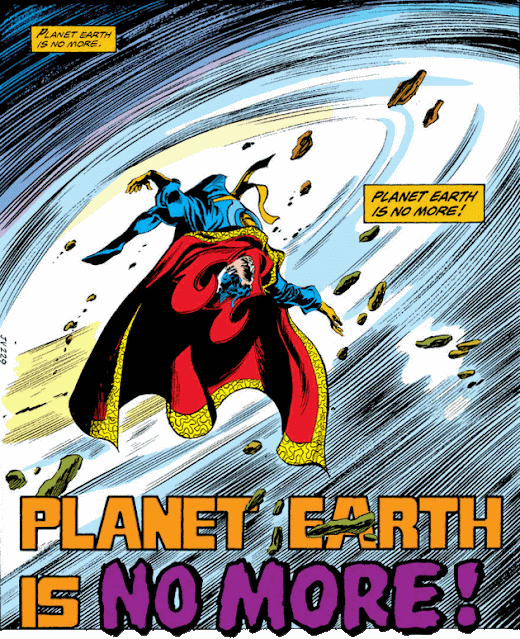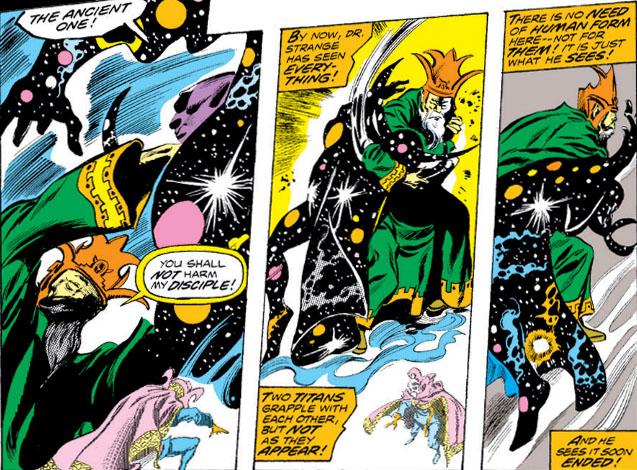Let's see--we were reviewing Doctor Strange #s 10-13. Where did we leave things?
Yikes, that's right! The Earth has been destroyed. And you and I are dead.
The End.
The End.
But it looks like there's a body in all of that rubble and planetary debris: Doctor Strange, Master of the Mystic Arts. It was his battle with Baron Mordo which resulted in the Earth's destruction--and it looks like he's the sole survivor. But, how can that be? At least we can take a good guess at his state of mind right now.
Strange's grief and sorrow are certainly understandable. But, what does he do now? Float around in the void, in the area where his home planet used to be? Well, if you're the disciplined Dr. Strange, you start to pull it together, whatever the circumstances.
Yeahhhh--about that "power of prolonged life" part, allowing him to live through the disaster. In a word: baloney. Strange is speaking of the time when the Ancient One progressed to a higher plane, and bequeathed his status as Sorcerer Supreme to Strange--and as a result Strange would now have a longer natural lifespan as did the Ancient One. But exactly how does having a longer lifespan allow you to survive injury or death while the ground you're standing on (as well as everything else) is being blown to smithereens? Let's even use a less planet-wide example. If, say, Gorgon attacks Strange, can Strange just ride out the massive shockwaves without injury? Can he just laugh off strikes by Blastaar? Nitro?
While we're on the subject--in all honesty, I've never been fully on board with the whole "Sorcerer Supreme" concept, which writer Steve Englehart introduced with the Ancient One's ascendance.
The title tends to raise the bar too high for Strange. Is he really the "supreme" sorcerer--i.e., above all other sorcerers? More sorcerous knowledge than anyone else? More power? As readers, we can appreciate the status it gives Strange in terms of his being the Ancient One's successor--but just how literally are we to take it? And what does it say about Strange? Does he now rule out that any other practitioner of the mystic arts can be as wise, as learned as himself?
But let's put these things aside, because Strange has a lot on his plate right now. He definitely has all the time in the world now (oops, he doesn't have a world anymore, does he?) to think his way out of this mess--and in doing so, he returns to one of the clues Englehart dropped along the way.
But make sure you don't drift off--we're just getting to the good stuff!
Nightmare, of course, is as happy to see Strange as ever--NOT--and so he launches a series of attacks against him. Yet, curiously, their purpose is not just to disable him, but to also gauge the extent of his power, which Nightmare should already know full well. Strange makes sure to satisfy Nightmare in that respect, by overwhelming his foe and defeating him.
Once Nightmare is down, Strange happens to spot an object in the distance, and investigates what turns out to be the key to this entire affair.
Yes--it was never Strange or anyone else who was under Nightmare's influence, but Eternity himself (and, through him, Mordo). As to how Eternity succumbed to Nightmare, it seems we have humanity to blame (if somewhat indirectly) for giving Nightmare the power he needed.
Strange, of course, feels obliged to take one hell of a victory lap. But before he can do so, Eternity has one more announcement to make, and this time it's for real:
With Eternity's refusal to set things right, Strange is somewhat less than tactful in his response, his stinging words making an obvious impact on this enigmatic being. But as Eternity prepares to bring about Strange's silence in a rather terminal way, the unexpected arrival of another gives him pause, and more.
And while Eternity licks his wounds (who knew the old guy had those kinds of moves?), the Ancient One explains to his former pupil his presence in Eternity's dream. Yet it appears Eternity is still resolute in his decision.
So, what to do? We're all waiting for a satisfactory end to this story--and I, for one, would like to wake up tomorrow on an intact planet, and, like Eternity, find this was all just a bad dream. Though I'd settle for just waking up. So let's see what Eternity's solution is:
It seems a reasonable compromise. We don't get the original Earth--but we get an indistinguishable replacement. Strange, of course, will be the only person on the planet who has to live with the knowledge that the entire planet and everyone on it are recreations, though I suspect that's just Eternity being a little spiteful in return for Strange's prior insolence. But with the victory Strange has pulled from this unbelievable near-disaster, he's probably not dwelling on that to any great degree.
And so ends a very clever and entertaining four-part story by Englehart, Colan, Palmer and company.
Too bad a later writer scrubbed it all.
Englehart's follow-up scenes in later issues really showed some promise, as far as potential story material. Imagine finding yourself in the uncomfortable position of having to tell your friends and loved ones that they're not the original version of themselves. That their "real" self, along with their entire world, is dead.
But when Englehart left the series, and Marv Wolfman took the writing reins, it seems that it was really Wolfman, rather than Clea or any other recreations, who couldn't bear the thought of things as they now were. In just one panel, he has Xander, an agent of "the Creators," wipe away events that took several issues and who knows what amount of plotting to be put into motion.
If it makes you feel any better, it was either Wolfman taking this action now, or Brian Bendis making it into a crossover event down the road that would have had every major character in the Marvel universe banding together in rage against--Strange? Eternity? I suggest we simply be grateful we'll never find out.
 | Doctor Strange #s 10-13 Script: Steve Englehart Pencils: Gene Colan Inks: Tom Palmer (Frank Chiaramonte on #10) Letterers: Tom Orzechowski and John Costanza |






















4 comments:
I got hugely into Ditko Strange tales a few years back, but I didn't find my interest sustained during the Brunner years. The art was certainly lush and extraordinary, but it just seemed to whittle down to 'the-monster-of-the-week' type stories.
This 4-parter indeed looks quite good, will have to pick it up.
Did the moon get destroyed and recreated too otherwise the Watcher would have seen it all and would know it wasn't the real Earth. This means there was a time in the '70s when , according to Marvel, there were two fake Earths in orbit round the Sun - Counter Earth and recreated Earth.
David, I think you'll enjoy it thoroughly. (Especially in its less-condensed form!)
Colin, that is such a great point about the Watcher! It's sort of unnerving to realize that an entity like Eternity can have an "oops" moment, isn't it?
They also wiped out that issue where Doc Strange and Clea went back in time and Clea had sex with Ben Franklin!
They said it didn't happen, it was just a complicated illusion.
I can picture Ben Franklin in the afterlife, saying, "bummer!"
Post a Comment